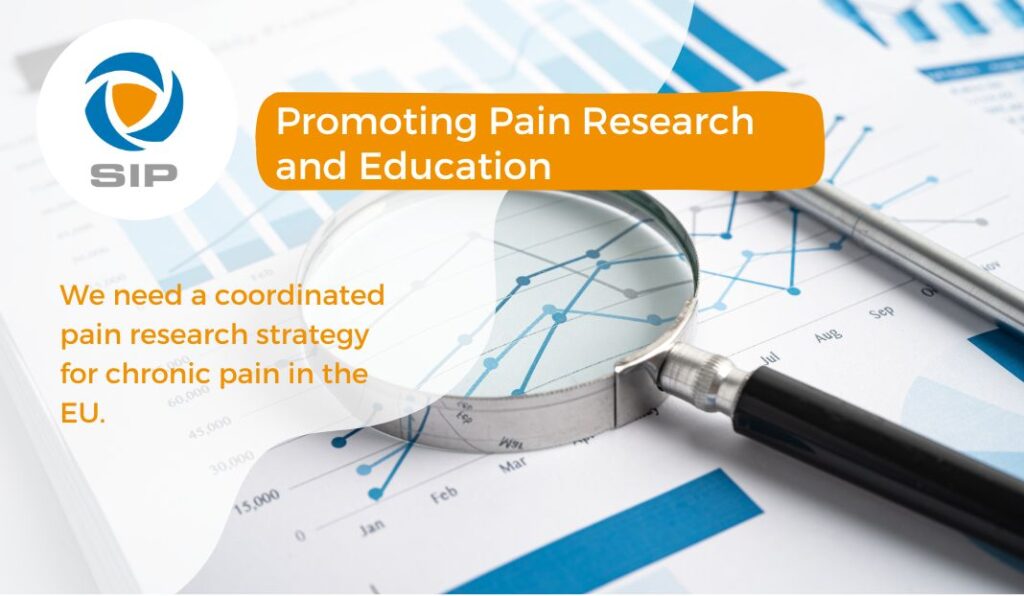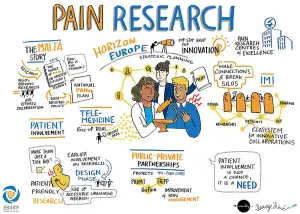
Promoting Pain Research and Education
We aim to raise awareness of pain science among healthcare professionals by advocating for pain education for healthcare professionals, patients, policymakers, and the wider public. We aim to strengthen the case for pain relief as a core element of human dignity, health equity, and quality of life, aligning with EU values and international obligations. At the same time, we ask policy makers for increased investment in research programmes to better understand the societal impact of pain and overcome current barriers in pain education, treatment and management.
We aim to identify and analyse gaps in national and European funding for pain research — including basic science, clinical, and epidemiological studies — with a particular focus on the societal impact of pain. Based on this analysis, we aim to develop recommendations that reflect the priorities of civil society and scientific community. Therefore, we call on policy makers to take these into account when shaping future EU Framework Programmes.
We also call for coordinated action to foster education and awareness of pain across Europe. That includes sharing best practice, addressing knowledge gaps, and advancing pain education for healthcare professionals, patients, policymakers, and the general public.
We call on the European Commission to:
- Prioritise investment in pain research across EU framework programmes, employment, and health policy, with emphasis on the societal impact of pain.
- Include pain as a thematic area within mission-oriented and innovation programmes (e.g. Horizon Europe), covering topics such as effective treatment models, screening tools, e- and m-health, behavioural and systems-level research, cellular and molecular mechanisms, and precision medicine. Social science should be integrated to ensure a holistic approach.
- Support national governments in sharing best practices (e.g. patient and professional education).
- Promote awareness-raising campaigns and public information initiatives to foster societal understanding of pain as a public health priority.
- Promote research and innovation in digital pain management tools, such as mobile health (mHealth) apps, artificial intelligence, and telemedicine platforms that support personalised care and early intervention.
We call on National Governments to:
- Initiate patient education programmes and information campaigns in order to create public awareness of the short and long-term consequences of inadequate access to pain treatment, while promoting prevention and early intervention.
- Promote wider access to pain education within healthcare professions, especially to all those involved with assessing and treating pain, and including those supporting people with conditions for which pain is a comorbidity
- Allocate further investment in research (basic science, clinical, and epidemiological) on the societal impact of pain and make funds available through employment and health policy and research and innovation programmes.
Our commitments:
- Patient groups, healthcare professionals, and researchers foster the dissemination of research outcomes to their community and support a patient-led approach to pain research.
- Civil society, healthcare professionals and patient groups share best practices on pain education for patients, healthcare professionals, politicians and the broader community.
- Civil society, healthcare professionals and patient groups continue working on their educational programmes and projects targeted to these audiences.
Further Information
- Horizon Magazine, EU Commission: Why do people develop chronic pain?
- SIP Position Paper on inclusion of pain research in the 9th EU Framework Program
- IMI2 Pain Group
- SIP 2016, Maria-Jose Vidal Ragout: Pain, research: what can the EU institutions do?
- Dr. Elisabetta Vaudano: The Innovative Medicines Initiative (IMI) and pain research
- SIP 2012, Workshop 6: Registries as a base for pan-European health services research in the field of pain
- SIP 2011, Elisabetta Vaudano: Understanding Chronic Pain and Improving its Research in Europe
- SIP 2011, Patricia Reilly: Pain, EU, research innovation and science
Previous Strategic Focus Areas
Pain Research
Increase investment in research on the societal impact of pain.
We ask to identify and analyse gaps in national and European funding for research (basic science, clinical, epidemiological) on the societal impact of pain and drafting recommendations on how future EU framework programmes can fill these gaps. Such analysis should take into account the propositions on pain research prioritisation from the civil society and scientific community.
We call on the European Commission to:
- Propose further investment in research (basic science, clinical, epidemiological) on the societal impact of pain as a priority in future EU framework programmes as well as in employment and health policy.
- Support the development of pain centres of excellence across Europe and encourage a network for these centres to provide for better understanding of pain and offer better pain management.
- Include pain as a topic for its mission-oriented research and under its research and innovation programmes, such as Horizon Europe. These could include models for effective pain treatment within research programmes, the development of screening tools, e- and m- health platforms, behavioural research, systems-level research, cellular and molecular research, and the development of precision medicine. Given the holistic approach to the social impact of pain, representatives from social science should also be involved.
We call on Member States to allocate further investment in research (basic science, clinical, epidemiological) on the societal impact of pain as a priority in future EU framework programmes and make funds available through employment and health policy and research and innovation programmes.
Our commitments:
- Industry representatives, research institutions, healthcare professionals and patient groups build on the achievements of public private research partnerships such as Innovative Medicines Initiative (IMI) with the aim of translating them in real word applications.
- Patient groups and healthcare professionals foster the dissemination of research outcomes to their community and support a patient-led approach to research.
For further information about SIP long-term priorities visit the Joint Statement page here!
